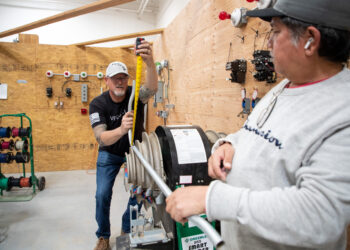
Culinary careers are sizzling again as the hospitality and restaurant industry bounces back from the pandemic and seeks to fill the positions vacated during the COVID-19 downturn. Chaffey College is doing its part to get more cooks in the kitchen.

Morongo Valley’s rugged, beautiful high desert is the gateway to Joshua Tree National Park, where nearly 3 million visitors flock every year. It’s a place where tourism, recreation and hospitality typically drive the economy. But when the pandemic shut down travel in the spring of 2020, it all came to a screeching halt.
With tumbleweeds blowing down the deserted streets as restaurants and hotels shut their doors, Copper Mountain College knew it had to help.
“Most of the small businesses … are very hand-to-mouth and depend on tourism traffic,” reflects Dr. Daren Otten, Superintendent and President of Joshua Tree’s Copper Mountain College. Before the camping boom rebooted in 2021, he recalls the many boarded-up businesses in town and the feeling of “desolation and desperation.”
The community’s need was plain, so Otten joined forces with Regional Director of Business and Entrepreneurship Lisa Kiplinger Kennedy and Retail, Hospitality, and Tourism Statewide Director Joy Hermsen to brainstorm a way to rally the region’s small businesses. They hit on digital marketing as a tool to turn the tides. As Kiplinger Kennedy says, “There are a lot of mom-and-pop-type shops that have been around that really have never had any type of a website or internet presence.”
The solution was a 100-percent virtual internship program, the first of its kind in the region. While students trained in marketing and social media skills, participating small businesses received coaching from the local Small Business Development Center (SBDC) and a much-needed marketing boost from interns.
“Each week, interns had to produce content to help market and brand these small businesses to their specific targeted demographic,” explains Otten.
Last June, Copper Mountain College piloted the Virtual Marketing Internship (VMI) program with 10 students and 10 companies. Learners with strong communication skills from diverse majors partnered with a variety of businesses, including property groups, hotels, small restaurants, and even a few nonprofits. Through a comprehensive remote curriculum hosted in Canvas, students took their skills straight to small businesses, gaining valuable, hands-on experience all while learning and working remotely.
“These VMI students are getting information directly from professionals in the field,” says Social Media Educator Kerry Rego, who helped develop curriculum and mentor students. From reading metric data reports to understanding photography aesthetics and social media ethics, along with mastering channels like Facebook, YouTube, and LinkedIn, students receive a comprehensive education on how to grow a customer base. Says the instructor, “They’re learning a tremendous amount of content that they really can’t get anywhere else.”
In fact, Rego explains that there are no full digital marketing programs at California community colleges, state colleges, or even universities. And while some training is available in extended education, those courses are generally expensive.
“There’s this big gap, and there really aren’t any systems set up to fill this massive need,” says Rego. “This VMI program is a perfect example of filling that need.”
According to Kiplinger Kennedy, the pilot program was immensely successful. About 30 percent of interns were hired after completing the program, some by the businesses they worked with and others by companies impressed by their real-world experience. Meanwhile, the program has paid off for local businesses as well.
“Now people are noticing them,” beams Kiplinger Kennedy. She even mentions one business participant that wasn’t prepared for the influx of customers.
“He started having all of these people showing up to his hotel,” recalls the director, “and he wouldn’t be there because he wasn’t expecting people to show up!
“I don’t think he realized how impactful it was going to be.”
With the pilot a proven success, the program expanded in the fall to include a cohort at Barstow Community College. The team is now looking into making the shift to asynchronous instruction, which could streamline content delivery for even more colleges, while making courses more convenient for students.
“Each time we run this, we’re trying to be more efficient,” explains Rego. “The goal is that this is going to be a turnkey program that basically will be available to any school in the California Community Colleges.”
As the program gains traction, says the regional director, it might expand even further. “If it goes well, I would like to be able to extend it out and use it as a best practice to show other states,” says Kiplinger Kennedy.
It’s a pioneering program that started right here in the “Innovation” Empire. And according to Rego, the VMI program could come at a pivotal time for small businesses across the country.
“Business owners are demanding [these skills] and have a very strong, panicky need because they don’t have many options, and they have nowhere to turn,” says the instructor. Rego also teaches at a California state university and confides that the number one request from industry is always interns with social media skills. “This is why I’m so passionate about this program. It’s this mountain of need, and we only have a thimbleful of supply.”
Rego shares that by the time students complete the program, they can command $20 an hour or more, with that number climbing as high to about $150 as professionals gain experience and skills.
“I spend a lot of time talking about how to get a job in this field, how to survive, what the skills are, and what directions you can go,” says Rego. With the right skills listed on their resumes and LinkedIn profiles, the instructor says, “That will immediately put five to 20 dollars on their hourly rate.”
On the other hand, Rego says about half of her students are entrepreneurs who are using their new skills to enhance their own businesses. Between job coaching, one-on-one mentorship, and learning everything from self-promotion to contract-writing, students now have the tools to build and bolster their own ventures.
According to Otten, the VMI program exemplifies a perfect community partnership, closing the skills gap for both students and small business owners while fostering a stronger regional economy.
“In this new world we’re living in, remote work is a thing,” says Otten. Now, skilled students can work locally and beyond to enhance businesses’ online presence. “I think this has opened up an awful lot of doors.
“It gave our students a skill set that I want to say is almost pandemic-proof.”
For Rego, helping learners not only survive but thrive in the new economy is the name of the game.
“A lot of our students have had to adapt — they’ve lost family members and breadwinners, childcare opportunities and jobs,” says Rego, convinced that the six-to-eight-week internship program is helping to turn things around.
“Students can have fun jobs that they can very likely now do entirely from home,” says the proud instructor. “The opportunity feels like and is nothing different from a true gold rush.”

Culinary careers are sizzling again as the hospitality and restaurant industry bounces back from the pandemic and seeks to fill the positions vacated during the COVID-19 downturn. Chaffey College is doing its part to get more cooks in the kitchen.

Dual Enrollment (DE) is catching on as students and their families recognize the advantages of earning college credit while still working towards high school graduation. But students aren’t the only… Read More – Good News for Community Colleges: Dual Enrollments Are on the Rise

Enrollment in courses not offering credit toward a degree or certificate are outpacing for-credit programs in some states (Fed Communities). And it’s no wonder. With the convenience, minimal time commitment,… Read More – No Credit, No Problem: Noncredit Courses Gain Steam